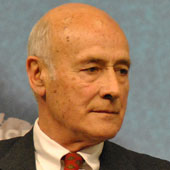Europe’s Soft Power
How can Europe’s soft power supplement U.S. efforts in its fight against terrorism?
May 3, 2004
The United States has enormous soft power resources, and has often used them effectively to achieve outcomes it wanted.
Given America's role as a leader of the information age, the opportunities for American soft power should increase if the nation acts skillfully. But the United States is not alone.
Others — both countries and nonstate actors — also possess soft power that can be used to help or hinder the United States' achievement of its preferred outcomes.
In terms of other potential soft power resources: France ranks first in Nobel Prizes for literature. Britain, Germany and Spain are third, fourth and fifth.
Britain, Germany and France rank second, third and fourth in Nobel Prizes in physics and chemistry.
Music, internet usage and tourism
Britain, Germany and France are third, fourth and fifth (behind the United States and Japan) in music sales.
European promotion of democracy and human rights helps advance shared values that are consistent with American objectives.
Germany and Britain are third and fourth in book sales and fourth and fifth as Internet website hosts.
France ranks ahead of the United States in attracting tourists (albeit heavily from its neighbors in Europe).
Political asylum and birth expectancy
Britain is first and Germany is second in attracting applications for political asylum.
France, Germany, Italy and Britain have higher life expectancy at birth than does the United States.
Almost all European countries outrank the United States in overseas development assistance as a percent of GDP.
High marks for Europe
Soccer — Europe's primary sport — is far more popular globally than American football or baseball.
Though much smaller than the United States, Britain and France each spend about the same as the United States on public diplomacy.
A measure of the EU's emerging soft power is the view that it is a positive force for solving global problems.
In the wake of the Iraq War, Eastern Europeans and Turks gave the EU higher marks than the United States for playing a positive role on a variety of issues — ranging from fighting terrorism to reducing poverty to protecting the environment.
Closer to the mainstream
At the same time, many European domestic policies appeal to young populations in modern democracies.
For example, European policies on capital punishment, gun control, climate change, and the rights of homosexuals are probably closer to the views of many younger people in rich countries around the world than are U.S. government policies.
The new constitution of South Africa bears more resemblance to the European Convention on Human Rights than to the American Bill of Rights.
The European preference for multilateral cooperation has generated a few successes that have increased Europe's soft power — as well as its economic power.
Broad economic achievements
After a bumpy start, the Airbus consortium surpassed Boeing as the world's leading manufacturer of commercial jetliners.
In the mobile phone industry, European governments agreed on a single regulatory standard, GSM, as early as 1987, while Americans used a market-driven approach to allow a standard to emerge and dominate.
The effects of successful cooperation
The result was that Europe developed a stronger infrastructure than the United States and was able to dominate the wireless market in the 1990s.
A future test of the European approach will be the Galileo global navigation satellite system, Europe's answer to the U.S-based Global Positioning System (GPS).
While excessive bureaucracy can hamper the European approach, the ability to work cooperatively on large information infrastructure projects that serve as global public goods can increase Europe's soft power as well as its economic power.
Pushing for public diplomacy
Europeans also invest more in their public diplomacy. The Europeans have a longer tradition and spend more — particularly in international cultural relations. In this area France had the highest per capita spending — over $17 — and more than four times that of second-ranked Canada.
Britain and Sweden rank third and fourth. In comparison, U.S. State Department funding for international cultural programs spending was only $0.65 per capita.
Common interests
Soft power can be shared and used in a cooperative fashion. European promotion of democracy and human rights helps advance shared values that are consistent with American objectives.
The Islamist extremists of al-Qaeda are fighting against Western values — not just American values. European public diplomacy that counters their appeal is beneficial to the United States.
Excerpted from Joseph Nye’s “Soft Power. The Means to Success in World Politics” Copyright © 2004 Joseph S. Nye, Jr.
Read previous
Orchestra Baobab — Senegal’s Resurrection
May 1, 2004
